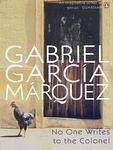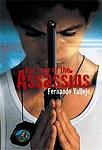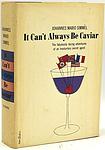The Greatest Colombian, Austrian "Fiction" Books Since 1950
Click to learn how this list is calculated.
This list represents a comprehensive and trusted collection of the greatest books. Developed through a specialized algorithm, it brings together 300 'best of' book lists to form a definitive guide to the world's most acclaimed books. For those interested in how these books are chosen, additional details can be found on the rankings page.
Genres
Countries
Date Range
Reading Statistics
Click the button below to see how many of these books you've read!
Download
If you're interested in downloading this list as a CSV file for use in a spreadsheet application, you can easily do so by clicking the button below. Please note that to ensure a manageable file size and faster download, the CSV will include details for only the first 500 books.
Download-
1. One Hundred Years of Solitude by Gabriel García Márquez
This novel is a multi-generational saga that focuses on the Buendía family, who founded the fictional town of Macondo. It explores themes of love, loss, family, and the cyclical nature of history. The story is filled with magical realism, blending the supernatural with the ordinary, as it chronicles the family's experiences, including civil war, marriages, births, and deaths. The book is renowned for its narrative style and its exploration of solitude, fate, and the inevitability of repetition in history.
-
2. Love in the Time of Cholera by Gabriel García Márquez
This novel follows the story of Florentino Ariza and Fermina Daza, who fall passionately in love in their youth. However, Fermina eventually marries a wealthy doctor, leaving Florentino heartbroken. Despite this, Florentino remains devoted to Fermina for over fifty years, patiently waiting for her husband's death to have another chance at her love. The story is set against the backdrop of a cholera epidemic, serving as a metaphor for the transformative power of love and the destructive power of obsession.
-
3. Chronicle of a Death Foretold by Gabriel García Márquez
The novel unfolds as a murder mystery, revealing the planned revenge killing of a young man named Santiago Nasar by the Vicario brothers. They believe Santiago has dishonored their sister, Angela, by taking her virginity before her marriage to another man. Despite the impending murder being common knowledge within the small Colombian town, a series of coincidences and misunderstandings prevent anyone from intervening, leading to Santiago's tragic and foretold demise. The narrative explores themes of honor, fate, and the collective responsibility of a community.
-
4. Correction by Thomas Bernhard
"Correction" is a complex narrative revolving around the life of a man named Roithamer, a genius obsessed with constructing an architectural masterpiece, the Cone, in the center of the Kobernausser forest. The story is told through the perspective of his friend who is reading Roithamer's notes after his suicide. The novel explores themes of obsession, isolation, and the pursuit of perfection, while also delving into the protagonist's troubled relationships with his family and society.
-
5. The Piano Teacher by Elfriede Jelinek
"The Piano Teacher" is a dark exploration of power dynamics, sexuality, and repression. The story revolves around a piano teacher at a prestigious music school in Vienna who lives with her overbearing mother in a state of emotional and sexual repression. Her life takes a turn when she becomes sexually involved with a young, self-assured student. The relationship, marked by sadomasochistic games and emotional manipulation, spirals out of control, leading to a tragic end. The book is a profound critique of bourgeois values and the oppressive structures of society.
-
6. Extinction by Thomas Bernhard
"Extinction" is a novel that explores the dark and complex themes of family, identity, and history through the eyes of its protagonist, a professor living in Rome. When he receives news of the deaths of his parents and brother in a car accident, he is forced to confront his past and his Austrian heritage. The narrative delves into his thoughts and feelings, his criticisms of his family and society, and his philosophical musings on life and death, all while he prepares to return to his family's estate for the funeral. The novel is renowned for its dense, stream-of-consciousness style and its unflinching examination of the human condition.
-
7. The Autumn of the Patriarch by Gabriel García Márquez
The novel explores the life of an eternal dictator who has ruled over a Caribbean nation for several decades. The patriarch's oppressive regime is marked by corruption, violence, and absurdity, while his personal life is characterized by loneliness and paranoia. The narrative is a complex, non-linear exploration of power, time, and the dehumanizing effects of political tyranny. The patriarch's death prompts a reflection on his life and reign, revealing a mythical, magical, and horrifying reality.
-
8. Concrete by Thomas Bernhard
The book is a darkly introspective narrative that delves into the mind of a reclusive, obsessive intellectual who is struggling to complete his scholarly work on the composer Mendelssohn. As he grapples with his own ailments and the perceived mediocrity of his surroundings, the protagonist's stream-of-consciousness monologue reveals his deep-seated anxieties, self-loathing, and profound isolation. The narrative is a relentless examination of the protagonist's psyche, showcasing his critical view of society and his own personal relationships, which are fraught with tension and dysfunction. Through this, the novel explores themes of artistic creation, intellectual elitism, and the suffocating nature of expectations and familial obligations.
-
9. Woodcutters by Thomas Bernhard
Woodcutters is a darkly humorous critique of Vienna's artistic elite. The story takes place over the course of a single evening, as the narrator attends a dinner party in honor of a recently successful actor. As the evening progresses, he reflects on the pretentiousness and hypocrisy of the guests, the mediocrity of their artistic achievements, and the tragic suicide of his former lover. The novel is a scathing indictment of the vanity and self-delusion of the artistic community.
-
10. No One Writes to the Colonel by Gabriel García Márquez
This novel centers around an impoverished, retired colonel who has been waiting for many years for the pension he was promised. Despite his increasing desperation and the urging of his wife, the colonel remains hopeful and proud, refusing to sell his only valuable possession, a rooster that he plans to enter in a cockfight. The story explores themes of poverty, pride, and the struggle for dignity amid difficult circumstances.
-
11. The Wall by Marlen Haushofer
The book is a profound exploration of isolation and survival, following a woman who finds herself unexpectedly cut off from the rest of the world by an invisible, impenetrable wall. With the rest of humanity seemingly vanished, she must come to terms with her solitary existence in a remote forested area, accompanied only by a few animals. As she adapts to her new reality, tending to the land and the creatures that become her companions, the narrative delves into themes of self-reliance, the intrinsic connection between humans and nature, and the resilience of the human spirit in the face of unimaginable circumstances. Through her introspective journey, the protagonist examines the essence of her being and the meaning of life when stripped of society and its constructs.
-
12. The Guiltless by Hermann Broch
"The Guiltless" is a novel that explores the disintegration of values and the rise of fascism in Germany between the two World Wars. It follows the lives of several characters, including a businessman, a musician, and a murderer, whose stories intertwine to paint a picture of a society in moral and social decline. The narrative delves into their personal struggles and moral dilemmas, reflecting the broader societal issues of the time and offering a critique of the political climate that allowed for the rise of totalitarian regimes.
-
13. The Left-Handed Woman by Peter Handke
"The Left-Handed Woman" is a poignant, introspective novel that explores the life of a woman who decides to live alone after her husband leaves on a business trip. She attempts to find her own identity and independence by distancing herself from her usual social circles, including her young son. The novel is a deep dive into her thoughts, feelings, and experiences as she navigates her new life, offering a profound exploration of solitude and self-discovery.
-
14. Wittgenstein's Nephew by Thomas Bernhard
"Wittgenstein's Nephew" is a semi-autobiographical novel that explores the friendship between the narrator and his friend Paul, who is the nephew of the famous philosopher Ludwig Wittgenstein. The story takes place in Vienna and is set against the backdrop of the Austrian mental health system. The novel delves into themes of sanity, insanity, and the fine line that separates the two, while also offering a critique of Austrian society. It is a meditation on the nature of illness, both physical and mental, and the impact it has on personal relationships and one's perception of the world.
-
15. A Sorrow Beyond Dreams by Peter Handke
This book is a poignant exploration of the author's mother's life and her struggle with depression, ultimately leading to her suicide. It provides a deeply personal and raw account of the author's attempts to understand his mother's despair and the societal constraints that contributed to it. The narrative is a profound reflection on memory, loss, and the complexity of human emotions, offering a stark and moving portrayal of a woman's life in a rigid, post-war society.
-
16. The Afternoon of a Writer by Peter Handke
"The Afternoon of a Writer" is a contemplative exploration of a day in the life of a solitary writer who, after a successful morning of writing, decides to take a walk through an unnamed European city. As he strolls, he grapples with feelings of alienation and existential dread, questioning his purpose and the worth of his work. The book delves into the writer's inner struggles, his observations of the world around him, and his reflections on the act of writing itself.
-
17. The Last World by Christoph Ransmayr
"The Last World" is a novel that reimagines the exile of the Roman poet Ovid in a remote village at the edge of the Black Sea. The story is set in a mythical time and place, where the villagers are haunted by strange transformations and echoes of Ovid's metamorphoses. The novel blurs the lines between the real and the imaginary, the past and the present, and the world of the living and the dead, creating a surreal and dreamlike atmosphere.
-
18. Why Is There Salt In The Sea? by Brigitte Schwaiger
The novel explores the life of a young Austrian woman who finds herself in a stifling marriage with a fisherman in a small coastal village. As she grapples with the mundane and oppressive nature of her daily life, she yearns for freedom and self-discovery. The sea, with its salt, becomes a metaphor for her tears and the bitterness she experiences, as well as the vast possibilities that lie beyond her current existence. Her internal struggle and the choices she faces reflect the broader themes of women's liberation and the search for identity in a world that often limits female autonomy.
-
19. The Adventures and Misadventures of Maqroll by Alvaro Mutis
"The Adventures and Misadventures of Maqroll" is a collection of seven novellas that follow the life of Maqroll, a seafarer and adventurer. The stories, set in various locations around the globe, are filled with philosophical musings, poetic language, and vivid descriptions of exotic locales. Maqroll's encounters with a host of characters, from pirates to prostitutes, and his experiences with love, loss, and loneliness, all contribute to a richly textured narrative that explores the human condition and the nature of existence.
-
20. Our Lady of the Assassins by Fernando Vallejo
This novel is a dark and gripping exploration of life in Medellín, Colombia, during the height of the drug wars. The protagonist, a middle-aged writer, returns home after many years abroad, only to find his city ravaged by violence and death. He falls in love with two teenage assassins, who guide him through the underworld of the city, exposing him to the brutal realities of life in a place where human life has lost all value. The story is a bleak commentary on the devastating effects of drug trafficking and political corruption on society.
-
21. Lust by Elfriede Jelinek
This book is a provocative exploration of the dynamics of power and desire within the confines of a loveless marriage. Set against the backdrop of the Austrian Alps, it delves into the life of a woman trapped in a relationship with her abusive and unfaithful husband, a powerful paper mill owner. The narrative dissects the commodification of sex, the objectification of women, and the societal structures that perpetuate these themes. Through a stark and unflinching examination of the protagonist's degradation and the pervasive corruption in her world, the novel presents a scathing critique of consumerism, the patriarchy, and the hollow nature of modern relationships.
-
22. 100 Years Of Solitude by Gabriel García Márquez
The novel chronicles the rise and fall of the Buendía family over seven generations in the mythical town of Macondo, founded by the family's patriarch, José Arcadio Buendía. The story delves into the lives of the Buendía family, whose members experience love, lust, obsession, and despair, intertwined with magical and surreal events. The family's history mirrors and critiques the social and political evolution of Latin America, exploring themes of solitude, destiny, and the inevitability of history repeating itself. The novel's rich, imaginative narrative has made it a cornerstone of magical realism, profoundly influencing the literary world.
-
23. The Snows Of Yesteryear by Gregor von Rezzori
"The Snows of Yesteryear" is a memoir that explores the author's complex and tumultuous upbringing in Eastern Europe during the early 20th century. Through a series of vivid and poignant anecdotes, the book delves into the author's personal experiences with war, displacement, and the collapse of the Austro-Hungarian Empire, offering a deeply introspective and nostalgic reflection on the fleeting nature of time and the enduring impact of one's past.
-
24. Désirée by Annemarie Selinko
The novel is a historical fiction that follows the life of Désirée Clary, a young silk merchant's daughter from Marseille, who becomes romantically involved with a young Napoleon Bonaparte before he rises to power. After their relationship ends, Désirée finds herself navigating the complexities of French society during a turbulent period, eventually marrying Jean-Baptiste Bernadotte, who later becomes King Charles XIV John of Sweden. The story, told through a series of fictionalized letters and diary entries, portrays Désirée's transformation from a naive girl into a mature woman and a queen, offering a unique perspective on the political and social upheavals of the Napoleonic era.
-
25. It Can't Always Be Caviar by Johannes Mario Simmel
The novel is a thrilling espionage adventure following the life of Thomas Lieven, a charming and resourceful banker who is reluctantly recruited into the world of international espionage during World War II. Despite his desire for a peaceful life, Lieven finds himself entangled in a web of intrigue, assuming multiple identities and engaging in a series of daring escapades across Europe. His culinary skills, wit, and luck become his greatest assets as he navigates through the dangerous game of espionage, outsmarting intelligence agencies and avoiding peril at every turn. The story is a blend of humor, romance, and suspense, showcasing the protagonist's attempts to stay alive and out of prison while reluctantly serving multiple warring governments.
Reading Statistics
Click the button below to see how many of these books you've read!
Download
If you're interested in downloading this list as a CSV file for use in a spreadsheet application, you can easily do so by clicking the button below. Please note that to ensure a manageable file size and faster download, the CSV will include details for only the first 500 books.
Download























